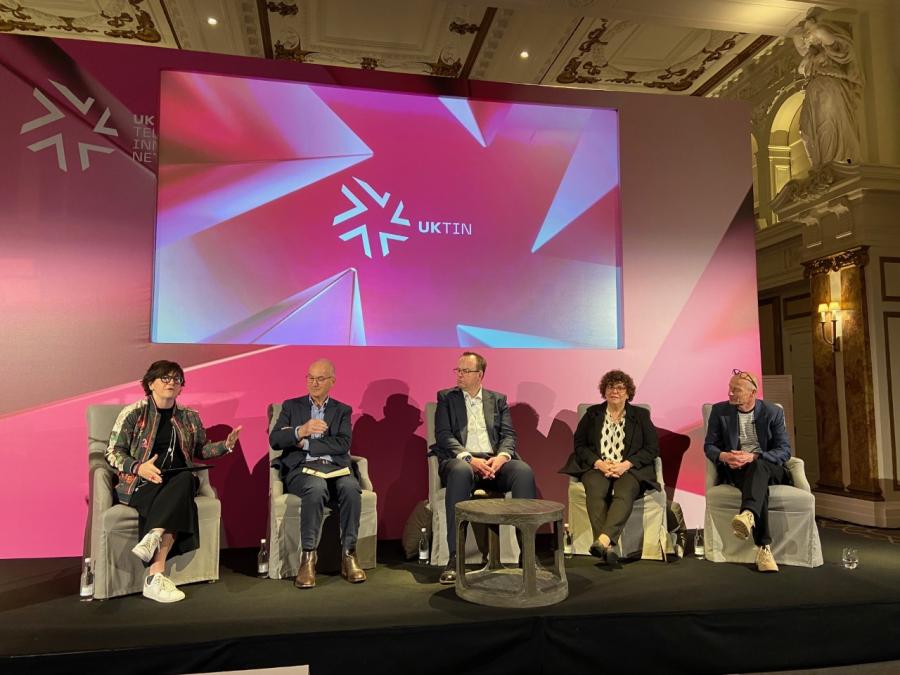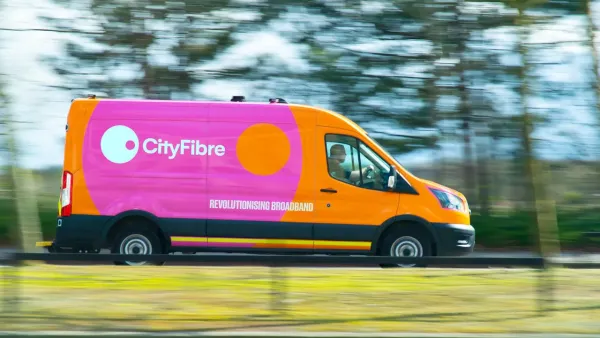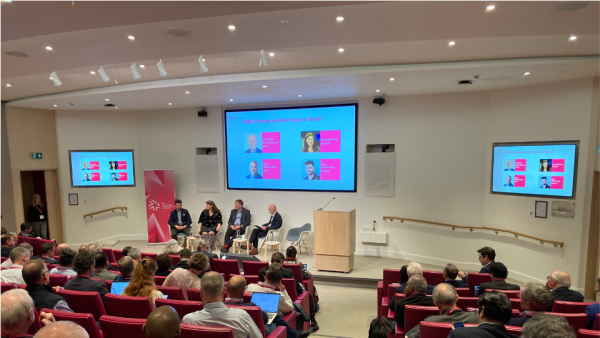
In London on the 27th of April, the UK Telecoms Innovation Network officially launched to a packed room. Across a series of panel sessions and informal networking, attendees explored UKTIN’s ambition to transform the UK telecoms innovation ecosystem, unveiling a range of services to help the UK tap into its strengths and capitalise on new opportunities for innovation and growth.
What is UKTIN?
UKTIN is the innovation network for the UK telecoms sector. Funded by the Department of Science, Innovation and Technology, it brings together industry, academics, and government to catalyse telecom's R&D investment, cooperation, and commercialisation.
Two years ago, the Telecoms Diversification Taskforce produced a series of recommendations, confirming the presence of a fragmentation of the innovation landscape: people were not connected. These recommendations have led to not only UKTIN’s creation, but also enduring policy, and industrial and investment objectives.
The network focuses on regionality, social value, skills and training, and the coordination of the UK’s telecoms’ future capability; it aims to address the sector’s most pressing issues, including supply chain diversification, long-term R&D, standards, and adoption.
Nick Johnson, Head of UKTIN, said: “UKTIN represents UK telecoms innovation, which in many places has become somewhat disconnected with itself and its global context. The goal is to nudge elements into line so that every link in the chain, including investment, has a clear picture of the landscape, can see where the next link is and where investments make the best business sense. We want to help the innovation ecosystem straighten itself out where it needs to and oil the wheels wherever there’s excess friction.”
Julia Lopez, Digital Infrastructure Minister in the Department for Science, Innovation and Technology, said: "We want the UK to be the best place in the world to research and develop cutting-edge technology. That's why we invested £10 million in the UK Telecoms Innovation Network, to bring together the best minds in the country to accelerate the development of future telecoms tech, which will underpin some of the most important economic advances in the coming years."
Keith Bullock, Programme Director, Future Network Programmes, DSIT, said: “UKTIN began with the policy thinking behind the 5G Supply Chain Diversification Strategy and has been strongly influenced through engagement with industry, taking the recommendations of the task force of senior industry representatives to shape the requirements for UKTIN”
Panel Session with the UKTIN Partners: Transforming the UK telecoms innovation ecosystem
Chaired by Cristina Data, Spectrum Director of Policy and Analysis, Ofcom, experts discussed the importance of neutrality and the global industry
Dr Joe Butler, Chief Technology Officer, Digital Catapult, kicked things off by reflecting: “Neutrality is critical for UKTIN. We must bring together discussions and debates. In telecoms, people often have very different opinions and we hope to represent this range. As Chair of the UKTIN project board, I think this is a vital principle that we must reflect on.”
Prof Dimitra Simeonidou, Co-Director of Digital Futures and Director of Smart Internet Lab, University of Bristol, said: “Our labs in Bristol are world-leading: we are working on telecoms across the spectrum, software and the cloud. I have worked in telecoms for 30 years, serving different telecom organisations, in academia and advising on policy groups. Yet this is the first time in my career that telecoms sit within the UK’s top five technologies. We are at a very good point here in the UK, both within our ecosystem and within the global industry.”
Robert Franks, MD, WM5G, added: “WM5G was the UK’s largest urban testbed. We spent three years collaborating with players, which have now been spun out as a commercial entity. We have three areas of focus, working in partnership to accelerate deployment, innovation, and adoption. It is the collective strength of clusters that will lead to success. I am so excited about the next ten years. Technology is transforming and will continue to transform. There are many challenges but plenty of opportunities too.”
Paul Crane, CEO of Cambridge Wireless, said: “There are many strengths in the UK, particularly within research. It is academic research that will create value in the industry. CW is a membership organisation for the tech industry. Our heritage is wireless, digitally connected technologies and our core activities are based around our membership: our peer forums work together to network and grow our companies.”
Fireside chat: The task ahead
Johnson and Dr Mike Short, Chair of the Advisory Board, UKTIN emphasised the need for different perspectives.
Short, said: “Inclusivity is essential. We took 120 companies to the MWC Barcelona world congress, the greatest number in any country. But there are still many areas that are not getting the funding they should be. I’m very keen that we do more work with accelerators and incubators. There should also be an emphasis on digital, and not just telecoms. Other sectors such as energy and transport have much more funding. Telecoms is a Cinderella in comparison. We must rectify this, and rebalance.”
Johnson, added: “Diversity and changes in the business model have fuelled that representation. But we are always looking for more. Every operator has a different perspective and we need to include that. We want to give people the connections they need. This is a necessary part of UKTIN. One thing I also want to flag is distinctiveness. People keep asking me is UKTIN just UK5G?”
Short responded: “The “T” is very important. This is about telecoms, rather than just wireless.”
Panel session with the UKTIN Expert Working Group Chairs: Enabling the UK to capitalise on its strengths
Chaired by Ros Singleton, Chair of Telecoms Supply Chain Advisory Council, panellists highlighted the need for collaboration
Barry Evans, University of Surrey, said: “We have an opportunity to grab this. I don’t think this is a question of what we are world-class in, but what could we be world-class in. Non-terrestrial networks could be the answer. From companies that build satellites and launch them to mobile network experts, we have every part of the puzzle. But how do we bring this knowledge together? How do we find a focus? That is the main challenge, I think.”
Simon Saunders, Chair of the Wireless Networking Technologies Expert Working Group, commented: “Since I was a child, broadly, the UK’s strengths and capabilities have risen from what was already a high base and then they fell, at the turn of the millennium. However, the number of activities today suggests a swing in the other direction. How can we build on that? There are a surprising number of companies that will help. Yet we must reach beyond our comfort zone to achieve our full capability.”
Dave Happy, Chair of the Security Working Group, added: “We must trust and defend these networks. But like most things, this comes down to cost. We have to be realistic about what we can achieve. We are volunteers. Let's draw on our expertise because damn it, this is the one thing that the UK is good at. We might be doing the greatest R&D in the world but remember, this is nothing without deployment.”
Tom Bennett, CEO at Freshwave and Chair of the Network Management Expert Working Group, concluded: “Collaboration is going to be the key, ultimately. One of the other challenges is to entice and empower the next generation. Where are the under-35s? They are the future.”
Panel session with the UKTIN partners: How UKTIN can help your organisation?
Chaired by Jon Hunt, University of Bristol, the experts encouraged the audience to “get involved”
Lesley Holt, WM5G, said: “UKTIN is here to facilitate talent and clusters. We have skill shortages. What can we do to change this? Are we looking at telecoms from a wider perspective too? What about the new skills? How do we make telecoms exciting? It needs to be very much collaborative. Let's drive greater awareness and investment into the UK.”
Simeonidou continued: “Where is the excellence? Where is the capability? It is very difficult to identify. One of the focuses for UKTIN is to provide the tools and guide people within the ecosystem to be able to make these capabilities discoverable.”
Mario De Miguel Ramos, Cambridge Wireless said: “The Supplier Specialist Guidance Service will guide you to the right research and services. Alongside this, it will help with business support and identify the right funding as well as the appropriate partners. We want to help you to put together strong consortiums. International support is also something we offer. At the heart of our service are our specialist advisers.”
Simon Bond, Bristol Innovations, said: “UKTIN is taking the translation of information to the next level. Enabled by our government, we are merging sectors. Get involved in the community at UKTIN’s online platform.”
The day concluded with a call to action from Johnson, asking people to get involved. He said: “This is about everybody working together to achieve UKTIN’s goals. There is going to be a series of events over the next two years and I hope to see you all there.”
Follow UKTIN on Twitter for further updates.
Other sessions can be viewed by clicking the following links:









